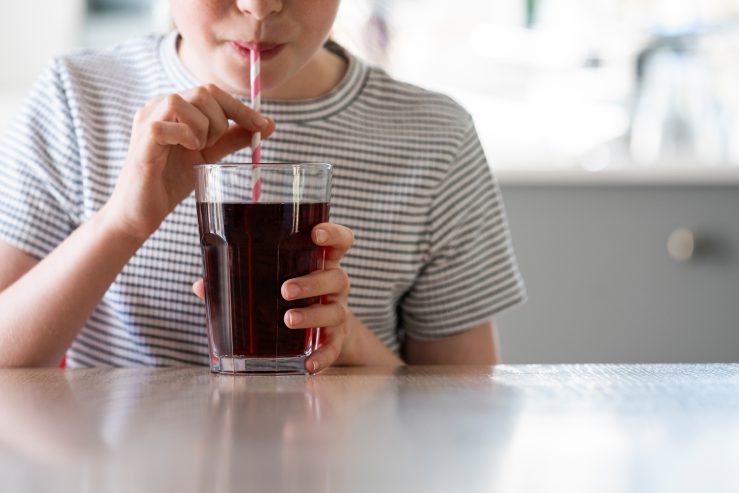For many, the day begins with a cup of coffee. You might consume a latte, soda, or energy drink as a part of your regular diet.
But caffeine can have significant health effects on children. Caffeine is a stimulant that is dose-responsive. That means the smaller the child, the greater effect the stimulant will have on their body.
Every year, children visit emergency departments with symptoms of rapid heartbeat and increased anxiety linked to caffeine consumption. Though rare, some heart arrhythmias in children are undiagnosed and could be worsened by the stimulant effect of caffeine.
So, it’s no surprise that the American Academy of Pediatrics (AAP) strongly discourages children and teens from consuming caffeine.
Never Miss a Beat!
Subscribe to Our HealthBeat Newsletter!
Thank you for subscribing!
You can now select the specific newsletters you'd like to receive.
You are already subscribed.
Subscribe to more newsletters in our email preference center.
Sorry, an error occurred. Please try again later.
Get Healthy Tips Sent to Your Phone!
Can Kids Drink Caffeine?
Most health care providers recommend children abstain from caffeine, especially kids under age 12. Babies and toddlers younger than 2 should never consume caffeine, according to the Centers for Disease Control and Prevention.
Caffeine, energy drinks, and other stimulant substances have no place in the regular diets of children and teens, according to AAP guidelines.
How Does Caffeine Affect Kids?
Caffeine consumption in kids is linked to a number of negative effects on health, behavior, and mood. Regular caffeine consumption can also cause the body to build a tolerance to the stimulant. Those who regularly drink caffeine may experience withdrawal without it.
When it comes to caffeine, children can experience many of the same side effects as adults. But because caffeine is dose-responsive and children are smaller in size, it may take less of the substance to affect their functioning as compared to adults.
Some of the side effects of caffeine consumption may include:
- Acid reflux.
- Dehydration.
- Increased anxiety.
- Increased blood pressure.
- Increased heart rate.
- Sleep disturbances.
A study from the Journal of Clinical Sleep Medicine suggests that caffeine can disturb brain function as kids sleep. Over time, this could lead to harmful effects on brain maturation. Another study published in the Journal of Caffeine Research, reports that the effects of caffeine may differ between males and females. After consuming caffeine, males exhibit a lower heart rate and an increase in systolic blood pressure, compared to females.
Are Energy Drinks Bad for Kids?
The AAP reports that between 30% and 50% of teens consume energy drinks.
Energy drinks are beverages that contain large amounts of caffeine and legal stimulants. They also contain additives and added sugar to produce a flavorful taste. Together, these concoctions can amplify alertness and energy, but they can also cause dehydration, jitteriness, and insomnia. Energy drinks are readily available at grocery stores, convenience stores, and gas stations.
There are no noted health benefits to consuming energy drinks, and most health care experts recommend that children avoid consuming them.
Boosting Energy, Bypassing Caffeine: Healthy Ways Increase Energy
Lifestyle changes can help increase your child’s energy. If you have concerns about your child’s caffeine consumption or day-to-day energy levels, talk to your health care provider. Together, you can develop a strategy for supporting your child. For example, if your child participates in sports, you might encourage them to turn to a sports drink instead of an energy drink that contains stimulants.
Some natural ways to feel more energized might include:
- Eating a well-balanced diet.
- Getting an appropriate amount of sleep.
- Limiting screen time.
- Managing stress and anxiety with healthy coping mechanisms.
- Starting an exercise routine.
- Sticking to a daily routine and sleep routine.
- Spending time outdoors.
Editor's Note: This article was originally published on , and was last reviewed on .
About Pediatrics
From nutrition to illnesses, from athletics to school, children will face many challenges growing up. Parents often will make important health care decisions for them. We hope to help guide both of you in that journey. UPMC Children’s Hospital of Pittsburgh is a national leader in pediatric care, ranking consistently on U.S. News & World Report’s Best Children’s Hospitals Honor Roll. We provide expert treatment for pediatric diseases, along well-child visits, urgent care, and more. With locations across Pennsylvania, Maryland, and West Virginia, you can find world-class care close to home. We also work closely with UPMC Magee-Womens Hospital, a national leader in care for newborns and their mothers. Our goal is to provide the best care for your children, from birth to adulthood and beyond. Visit our website to find a doctor near you.
